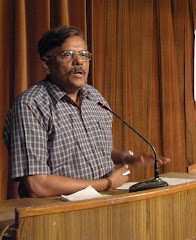
A famed policeman gives in to his literary heart
October 06, 2008
Lucknow: He has been a police officer for over 30 years, but Vibhuti Narain Rai, well known in Uttar Pradesh for his literary works and social activism, says he has finally got the job he yearned for.
In a week's time, 57-year-old Rai will take over as vice-chancellor of the Mahatma Gandhi International Hindi University in Wardha, Maharashtra, leaving behind all the frills of being a senior Indian Police Service officer.
"I have got the job I yearned for," Rai, now an additional director-general of Uttar Pradesh police, told sources at his spacious government accommodation in Lucknow even as he asked his driver to go home as it struck 6 p.m., the official time to relieve staff.
"My communist leanings don't permit me to retain the official driver beyond his time!" grins Rai, who hails from Jokhera village of Azamgarh, the same district whose name has been dragged in the mud for suspected terror links.
A 1975 IPS officer, he is an acclaimed Hindi fiction writer whose work is deeply connected to contemporary challenges facing the country.
"My 33 years of ground policing have taken me to both sides of reality, the behaviour of the government and the perception of people," Rai told sources.
Rai shot to fame with his book "Shahar Mein Curfew". It has been translated into English, Punjabi, Urdu, Marathi, Bengali and Kannada. It speaks about the plight of the minority community during communal riots and how the state and its representatives display a grossly partisan attitude towards them.
His notable books also include, "Combating Communal Conflicts: Perception of Police
Neutrality During Hindu-Muslim Riots in India", "Kissa Lok Tantra ", and "Tabadala".
"My association with Hindi literature started before I joined the police force and continued. And my association with the services has provided me the administrative acumen needed for being a vice-chancellor or leader of any institution."
The university in Wardha is perhaps the only one of its kind in the country dedicated to the Hindi language and its promotion and was set up by the central government in 1997 along with the Maulana Abul Kalam Urdu University in Hyderabad with a similar motive.
"The Hindi university in Wardha has hardly served its purpose and that's the challenge I want to take on."
He writes fiction but laces it with the poignant realities of time gleaned from the first-hand experiences of a police officer. His writings also reflect strong objective opinions.
Rai is an activist in his own right, often taking up issues of secularism.
His zeal to initiate social change saw him open a library in his village Jokehara to inculcate reading habits and spread knowledge among residents, especially women and Dalits.
Jokehara is a village of some 5,000 people, the majority of whom are Dalits and belong to backward classes. Rai himself belongs to the high caste of land-holding Bhumihars who are traditionally considered exploiters in the rural economy of the state.
Set up in 1994, his library Sri Ramanand Saraswati Pustkalaya, whose first librarian was a Dalit, has become a catalyst of change in that it has helped break the caste barriers in this village.
"The caste animosity in rural Uttar Pradesh could be understood from the fact that our Dalit librarian would sit on the floor when a high caste person came looking for a book and the latter would find it embarrassing accepting a book from a Dalit," says Rai.
All that has changed now. The library has now turned into a cultural centre of sorts and has established meaningful relationships with the National School of Drama, the Sahitya Academy and the National Book Trust.
"The library was just a starting point for overall capacity building of the villagers. The small backward village has produced good theatre artistes and singers with the help of the National School of Drama," he says.
"Our boys have started doing well on state-level sports events like volleyball and football, just with a little bit of encouragement in terms of some sports kits and personal support," Rai says.
The village is on the road to economic empowerment, with the library project finding some funding for the socio-economic development of women and Dalits.
"Multiple micro-empowerment initiatives can perhaps change India's development map," says Rai, as he gets into his small Maruti car to head for a talk on terrorism in India. IANS






































3 comments:
अक्सर हम दूसरों के नजरिये से वे चीजें सीखते हैं, जिनपर हमारा नजर नहीं पडती।
इस पोस्ट पर भी यही बात लागू होती है।
प्रस्तुति के लिए धन्यवाद।
> "My communist leanings don't permit me to retain the official driver beyond his time!"
I stopped reading right there. What the hell was the government thinking selecting a communist for a sensitive post like this, in a sensitive state.
This fantastic blog has lots of helpful ideas for team leader! Loved the vision and context outline example
Post a Comment